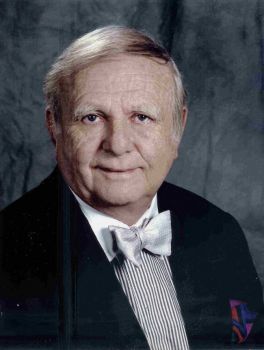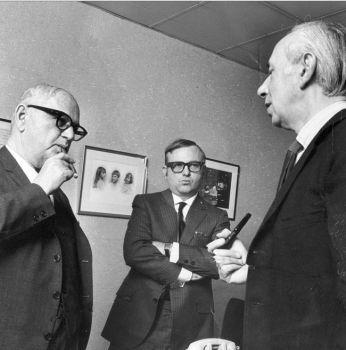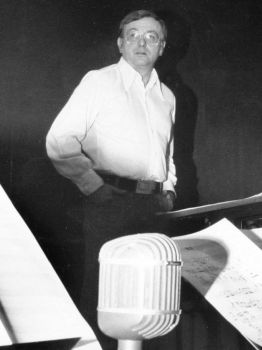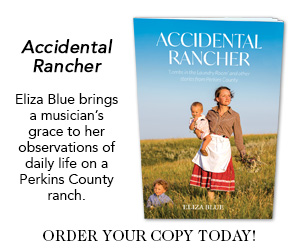The Gift of South Dakota
Subscriptions to South Dakota Magazine make great gifts!
Subscribe today — 1 year (6 issues) is just $29!
Music Man
Composer and Aberdeen native John Cacavas died Tuesday, Jan. 28 at his home in Beverly Hills, Calif., at age 83. During his long career in Hollywood, Cacavas scored more than 400 one-hour TV shows (including Kojak and Hawaii Five-O), 50 television movies and 15 feature films, but he got his start in the Hub City. He is survived by his wife Bonnie, also an Aberdeen native, and three daughters.
A memorial service was held in California, but local donations for the John Cacavas Memorial may be made in his honor to the Aberdeen Public School Foundation, 1224 Third St., Aberdeen, SD 57401.
In 2003, Cacavas wrote a short memoir for South Dakota Magazine. Here is his story in his own words.
MUSIC. THAT’S WHAT I DO. Compose, orchestrate, conduct and produce it. All kinds. It all began in Aberdeen in the early ’40s. My hometown was musically rich with junior and high school bands, orchestras and choirs, plus the various musical organizations from Northern State College. There was a civic orchestra, a municipal band, a Shriner’s Band and about seven dance orchestras, not to mention church choirs, concerts from visiting organizations and artists and private music lessons galore.
The first phase of my musical career was a disaster. Like a lot of 11-year-olds, I took piano lessons on Saturday mornings. I was so ungifted on the keyboard that I flunked my first year and had to go to summer piano school. Regular summer school, OK, but summer piano school? It was very embarrassing, not only to me, but also to my folks. They thought maybe they were raising a real dummy. After all, there was some talent in my family. My mom played piano by ear (black keys only), and my dad was a great dancer, performing Greek dances and jitterbug routines.
When they told me I didn’t have to take lessons any more, I was relieved. Now I could play baseball with Bob Keeler’s South Side team.
But one Sunday afternoon when I was 13, my life changed forever. I went to the Capital Theater and saw a movie called “Stage Door Canteen.” Many of the nation’s big-name bands were in it — Benny Goodman, Count Basie, Guy Lombardo and others. I immediately decided that I wanted to be a saxophone player. My dad, citing my failure as a pianist, was not excited about participating in another fleeting interest. But eventually, with great reluctance, he bought me a used alto sax at Gallet’s jewelry store on south Main.
I taught myself to play the sax, and a couple of months later, as a seventh-grader at Simmons, I joined the junior high band. I had found my dream.
A year later I started my own six-piece band, and played my first professional engagement. Where? At the Moccasin recreation center for my own 14th birthday party. My mom hired me. I think my folks paid us $5 each. We knew only six songs, but it was a start.
When I was a sophomore at Central High, I had a falling out with the school’s band director. He did not approve of my being a professional, so I left the high school band. Even though I had started and was leading a terrific 16-member school dance band, “The Golden Blues,” it was not a hard decision.
We had 11 players in my new band, and we were not too bad. Life on the road appealed to me more than playing and freezing at high school football games. Besides, now I was getting paid to play. My parents backed me all the way. They bought me musical arrangements, a public address system, music stands and spotlights. Even a car and trailer.
I gradually began making musical arrangements for my band. My first efforts were not so hot, but gradually I became more proficient at the art.
While still in junior high, I had worked at our family restaurant, The Virginian, on south Main. I worked as a waiter — and later as a chef — from 7 a.m. to 2 p.m. on weekends and seven days a week during vacations. For that I got $11 a week.
One day I got a call from a local bandleader, Bill Klitz. He had an 11-piece band with a four-man sax section, and one of his sax players was ill. Could I take his place? You bet! The job was at Tacoma Park, a few miles northeast of Aberdeen. They picked me up, I played the job and I was a big hit. They even let me play a few jazz solos!
Afterwards the musicians lined up for their pay. For playing three hours and having the best time of my life, I got $14! I got home about 2 a.m. and woke my parents. I told them about my evening with the band and how much I’d been paid. My dad looked at me for a moment, and said, “I think it’s time for you to leave the restaurant business.” And I did.
My band played all the local venues, the Roof Garden (no longer there), private parties at the Alonzo Ward Hotel, the Country Club and Wylie Park, even in towns up to 200 miles away.
After high school I attended Northern State College for two years. My band prospered, and we grew in demand. I then transferred to Northwestern University in Evanston, Ill., where I began writing songs for campus shows, and my life-long passion for serious music flowered.
From there I got drafted and became a music arranger for the United States Army Band in Washington, D.C. It was a great time, and I learned an awful lot. There were a few South Dakota guys in the band, and we had mini-South Dakota reunions with some fellows in a nearby Air Force Band.
After my discharge I moved to New York. I had succeeded in getting some of my works published, so I felt I was on my way. I pounded pavements, wrote jingles and songs and became a freelancer for many publishers. My first song to connect, “Over and Over,” was recorded by Guy Lombardo. He played it on the “Ed Sullivan Show.”
By this time I realized there were thousands of sax players, but not many arrangers and composers. I decided that a wonderful phase of my life was over. I sold my sax one month to pay the rent.
In New York I continued to get my school music published, did a lot of arranging and even became the second conductor at CBS, a great step upwards.
During this time I was courting an Aberdeen girl, Bonnie Becker, whose parents owned the Harbor Cafe in Aberdeen. After much persuasion, cajoling and threats, she married me. As a psychiatric social worker, she had the regular job and I was the freelancer who also did the cooking. It was a great arrangement, and one of the smartest moves of my life. After 44 years together and three wonderful kids, that ain’t bad!
Bonnie went on to become a lyric writer. After all, why not keep it in the family? After our daughters were grown, they too wrote many lyrics for publication. Bonnie also began writing cookbooks, and for the last few years has been a crisis response counselor.
After visiting another Aberdeen lad, Charles Buttz and his wife Terri, in Darien, Conn., one weekend, we decided to move there. It was a small New England town and looked like a fine place to bring up kids. I became director of publications and later acting manager of Chappell & Co., Inc., then and probably now the world’s largest music publishing house. That position and a short tenure at Bourn Music as an arranger were the only full-time jobs I ever had. Not counting my career in The Virginian, of course.
We went to London to record my first album, which turned into a love affair with that city for Bonnie and me. I still do a lot of recording in London, so we have an apartment in the city and manage to spend about three months there each year.
In 1973, Hollywood called, and we’ve been here ever since. During those three decades, I scored hundreds of movies, TV shows and albums.
I don’t think any of this good fortune would have happened without my upbringing in South Dakota. I learned real values and had the opportunity to pursue my musical dream. It was a happy and golden time.
Editor's Note: This story is revised from the March/April 2003 issue of South Dakota Magazine. To order a copy or to subscribe, call 800-456-5117.













Comments
Mr. Cacavas sounds a lot like my dad!
My dad passed away in 2011 at the age of 82.
My condolences.